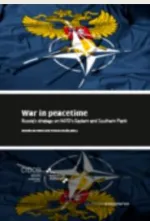Foreword. War in peacetime

CIDOB and The Institute for Statecraft are pleased to publish this report addressing Russia's strategy towards the Southern and Eastern borders of Europe.
The growing assertiveness of the Kremlin represents one of the main challenges for NATO and the EU. Since the annexation of Crimea and the subsequent undeclared war in eastern Ukraine, we have witnessed increasing military tension in the Nordic-Baltic region; an increase in the projection of Russian power towards the Mediterranean - from Syria to Libya and with aspirations to strengthen their influence in Algeria- and; the growing, and increasingly well-documented, efforts of Russia to interfere in electoral processes and internal crises in some member states with the aim of undermining the legitimacy of their democratic systems. NATO and the EU are facing an actor willing to compete strategically and to confront them directly, now, both in their common neighbourhood and on the ideological and political level in each of their domestic contexts. NATO and the EU, meanwhile, are still only in the process of trying to build a sound strategy to deal with this and other key challenges.
The risk of disagreement and the consequent loss of a unified sense of purpose, between those NATO members who look to the East and those who are affected more by events in their southern neighbourhood is one of the main threats to the coherence of the Atlantic Alliance today. Both the southern and eastern flanks present serious risks and threats, but their nature could not be more different. The times in which the same doctrine and position could serve to address threats all fronts are gone forever. NATO needs to square this circle very quickly if it is not to be seriously damaged by the division, which its opponents are quick to exploit. Likewise, NATO must adapt and prepare itself for the sub-article 5 environment and multidimensional political warfare that it now faces, and will most certainly have to face in much greater measure during the coming decade. The threats may be more diffuse, their origins more uncertain, but their effects will not be less devastating. The international context is acutely and quickly transforming and the survival and success of each of the international actors will be determined, above all, by their ability to adapt. This report aims to stimulate debate in this crucial area, offering some useful ideas and elements to help improve analysis shared understanding among the Allies.
We would like to express our gratitude to the Public Diplomacy Division of NATO for its support in the organization of workshop held in Barcelona in January 26-27, 2017. This seminar gathered around the table for the first time some forty authoritative voices from the Eastern and Southern neighbourhoods and from across NATO and the EU. This is no small milestone if we take into account that those who deal with the East rarely dialogue with those who deal with the South. This reality illustrates the problem NATO HQ has to deal with if it is to maintain the coherence and the internal consistency of the Alliance. The discussions held during two days of intense debate are the core of this report and of the research agenda that CIDOB and the Institute for Statecraft -two institutions that strive for accurate analysis and to contrast different perspectives- have shared during 2017.